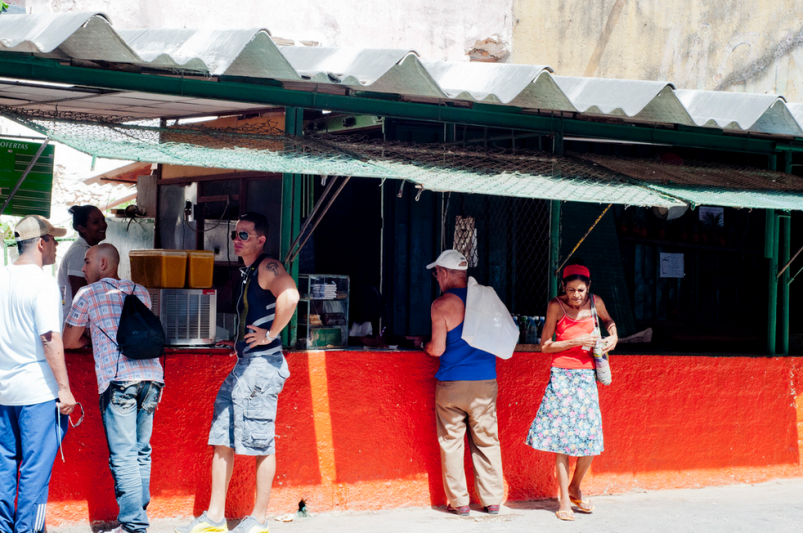Yesterday morning, American U.S. aid worker Alan Gross, in prison for five years on charges of covert action against the Cuban government, was released after months of negotiations. In addition, the U.S. traded three jailed Cuban spies for another of our jailed intelligence assets. And the news grew bigger: At noon, Presidents Obama and Raúl Castro gave concurrent speeches. President Obama told the nation that his administration was taking the first steps toward normalizing relations with Cuba—establishing embassies and ambassadors; re-assessing Cuba’s position on the list of state sponsors of terrorism; increasing travel, commerce, and the flow of information between the two countries. President Castro told his country that the economic embargo should stop, and that President Obama deserves respect for taking the first step towards healthier relations between the two nations.
Let me say that again: A Castro urged his nation to respect the decision of an American president. This news hints at more than embassies and spies returning to their homes; it reflects the start of a new era for Cuba and the United States. Sources on the ground in Havana reported that, just after noon, the bells of the city’s churches began to ring in a spontaneous chorus. The embargo, long seen as problematically convenient for the Castros, who have cited it to explain so many material shortcomings in Cuba, has in a day become the legal relic it has symbolized since the fall of the U.S.S.R.
Cubans have been acting as if change was coming ever since Castro and Obama took their respective offices. When I moved to Cuba in 2009 to research a book on the youngest generation raised under Fidel Castro, a sense of tenuous optimism hung in the air. Optimism because Castro, then a year into his presidency, promised reforms in Cuba, and because we Americans had recently elected Obama; tenuous because most of the things that Cubans were doing to prepare for the hoped-for changes were still illegal.
I profiled a Santeria initiate, Isnael, who painted an expat’s home for an under-the-table paycheck. I spoke with an engineering student, Lucía, who opened her door on Valentine’s day to a messenger bearing money her ex had sent from Miami, via the underground Western Union. Under 2009’s laws, Isnael was illegally charging for his handyman services, and Lucía’s money wouldn’t have qualified as a legal remittance, since her ex was not immediate family.
I learned of other coping mechanisms, too. The matriarch of the family with whom I lived for nearly a year taught me to order my food from a black market purveyor, who’d answer the phone with “oigo” — I’m listening — and then rattle off the items he’d bought from people who filched from government stockrooms or brought from abroad. I lived in the country thanks to a generous, pragmatic Communist Party bureaucrat who aided me with the essentially consular task of helping me get a visa. Our countries’ contentious relationships meant no embassies and difficult dealings, and we both wanted to rise above them.
Most of these actions have, as it turns out, been prescient. Castro legalized Isnael’s handyman status in 2010, among a raft of other economic reforms; the next year, President Obama’s administration legalized remittances sent from the U.S. to non-family members in Cuba. Shops have opened in droves in Havana under Raúl Castro’s economic reforms. You can buy a bonsai tree in Old Havana or get graphic design done in Vedado storefront, have your nails done at a perfectly legal salon or eat at one of myriad sophisticated new restaurants. Even though my black market food purveyor still operates illegally — buying a product and re-selling on the ground in Cuba is something only the government can do — yesterday marked the moment that the hoops my Communist Party bureaucrat friend and I jumped through have dropped to the ground.
It’s thrilling that with yesterday’s developments, the “as ifs” are becoming realities. As the Cuban people become more prosperous, they will likely demand more rights, hope to participate more in their government. And the “as ifs” will roll on, changing Cuba ever more in their wake.
Julia Cooke is the author of The Other Side of Paradise: Life in the New Cuba. Her writing on Cuba has appeared in the Virginia Quarterly Review, the New York Times, and the Best American Travel Writing 2014, and she teaches writing at The New School.
Photo credit: Patrick Proctor







Cubans, young and old, are resourceful and energetic, making do with few resources or support.
I hope the flood of money that follows this thaw will not become a destructive catastrophe.
Many photos of a November 2014 trip to Havana here: https://www.flickr.com/photos/13968680@N07/
Want to see the GOP flip on all of this like a circus acrobat?
Have Raul Castro reach out to Sheldon Adelson about opening a casino in Havana.
i am fascinated by Cuba. despite extremely aggressive subversion by our USofA, a communist country, without the benefit of trade and in the presence of intense regional isolation, has been able to provide a standard of living that is acceptable (although paltry compared to our norms, everyone has access to shelter and food/water) and education/healthcare access that makes us look like fools. if the question of whether communism is a viable governmental structure is still relevant, in my opinion Cuba demonstrates that it actually very much is. and if the last decade or so in our country is any indication, unregulated capitalism is a potentially deeply flawed economic model.